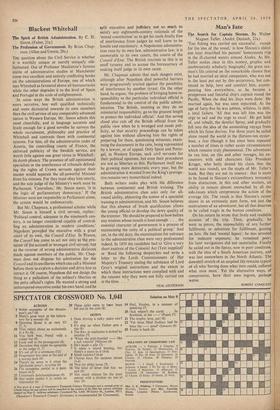Blackest Whitehall
the Spirit of British Administration. By C. H. Sisson. (Faber, 21s.) THE question about the Civil Service is whether it is worthily unique or merely uniquely old- fashioned. Out of Professor Mackenzie's famous stable of administrative studies at Manchester come two excellent and entirely conflicting books on the administrations of Europe, one of which sees Whitehall as favoured above all bureaucracies while the other degrades it to the level of Spain and Portugal in the scale of enlightenment.
In some ways the British administration is more secretive, less well qualified technically and more dictatorial towards its own members than the civil service of any comparably advanced nation in Western Europe. Mr. Sisson admits this most cheerfully, and in language accurate and lively enough for a good novelist he surveys the whole recruitment, philosophy and practice of Whitehall and contrasts them with continental systems. For him, all the administrative codes of Austria, the controlling courts of France, the enforced publicity of the Swedish service, are worth little against one great virtue in Whitehall : its dumb pliancy. The presence of self-opinionated specialists or the interference of tribunals defend- ing the rights of Crown servants against their master would separate the all-powerful Minister from his minions. For they must obey him utterly, and the sole judge of the Ministry's work must be Parliament. 'Centralism,' Mr. Sisson states, 'is in the logic of parliamentary democracy.' If the Minister were not responsible to Parliament alone, the system would be undemocratic.
But Mr. Chapman, a professional scholar while Mr. Sisson is himself a civil servant, replies : 'Political control, adequate in the nineteenth cen- tury, is no longer considered capable of control- ling an administration in modern conditions.' Napoleon provided the executive with a great court of its own, the Conseil d'Etat. In France, the Conseil has come to act not only as the pro- tector of the accused or wronged civil servant, but as the reverser of wrong administrative decisions made against members of the public. Mr. Chap- man does not disguise his admiration for the Conseil and its ancillaries which can call a Minister before them to explain a decision and drive him to retract it. Of course, Napoleon did not design the thing as a palladium of the subject's liberties or the petty official's rights. He wanted a strong and unhampered executive under his own hand, and he split executive and judiciary not so much to satisfy any eighteenth-century rationale of the 'mixed constitution' as to get his tools finally free of interference from judges he well knew to be hostile and reactionary. A Napoleonic administra- tion runs by its own law, administrative law; it is answerable to its own courts, the courts of the Conseil d'Etat. The British reaction to this is to snuff tyranny and to accuse the bureaucracy of making itself judge in its own cause.
Mr. Chapman admits that such dangers exist, although after Napoleon died powerful barriers were progressively erected against the possibility of interference by another tyrant. On the other hand, he argues, 'the problem of bringing home re- sponsibility to the particular individual official is fundamental to the control of the public admin- istration. The British, insisting as they do on ministerial responsibility, go to the greatest length to protect the individual official.' And this saving cloud also cuts off the British official from the public view when he is wronged and needs pub- licity, so that security proceedings can be taken against him without allowing him the rights of preparing for them, questioning witnesses, exam- ining the documents in the caSe, being represented by a lawyer, or of appeal. Only Spain and Portu- gal, in Western Europe, sack civil servants for their political opinions, but even their procedures are not as Siberian as this. Parliament itself may be growing more democratic every year, but the administration it wrested from the King's preroga- tive remains very monarchical indeed.
Both writers make play with the difference between continental and British training. The British administrative class asks only for all- round ability, abhorring the notion of a specialist training in administration, and Mr. Sisson believes that this absence of brash qualification allows the young official to develop the dewy quality of the trimmer. 'He should be prepared to bow before any wisdom whose mouth is loud enough . . . the essential character of government is a process of maintaining the unity of a political group.' And yet, in the old days, the examinations for entrance to the administrative class were very professional indeed. In 1859 the candidate had to 'Give a very short analysis of the Colonial Act (Text supplied)' or 'Read the following despatches and write a letter to the Lords Commissioners of Her Majesty's Treasury stating the substance of Lord Grey's original instructions and the extent to which these instructions were complied with and the reasons why they were not fully carried out at the time. . .
NEAL ASCHERSON






































 Previous page
Previous page